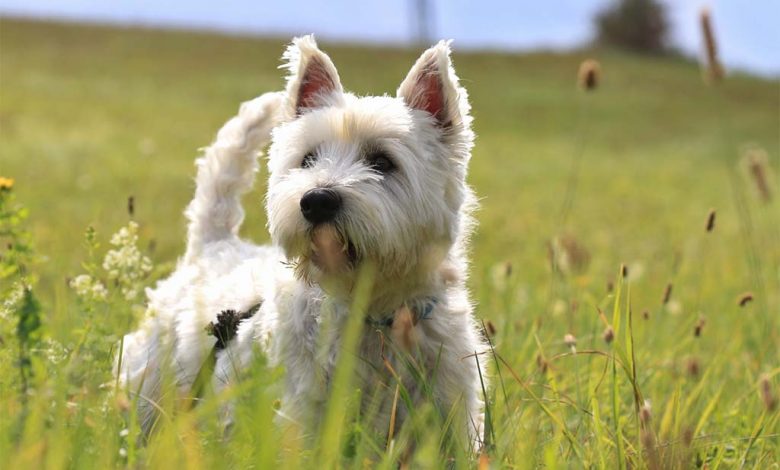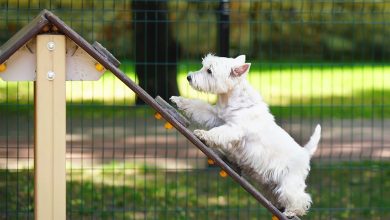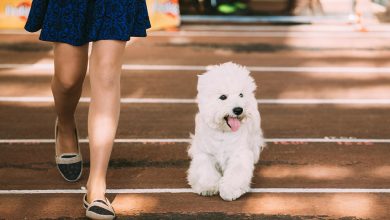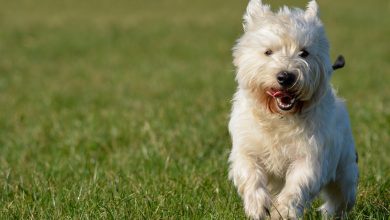Improve the Wellbeing of Your Westie
Enrichment comes in many forms, and regularly including a range of these activities can help reduce the stress and improve the general health of our westies.
Food
Delivering our dogs’ food to them in varied and engaging ways can be an easy way to boost their mental stimulation on a regular basis. Whether using their meals or treats for these activities, prompting our dogs to use their noses and brains to earn some tasty morsels is a great way to allow them to use their natural drive to forage.
Ideas of feeding enrichment include stuffed Kong toys or Licki-mats, puzzle feeders, scatter feeding and food treasure hunts.
Social
Dogs are highly social animals. Opportunities to interact socially both with other dogs and with humans can be hugely beneficial for a dog’s mental wellbeing. In fact, research has shown that interactions with humans can lower dogs’ levels of the stress hormone cortisol (Coppola, Grandin & Enns, 2006). Similarly, dogs showed reduced behavioural signs of stress when given the chance to play with another dog (Hunt, Whiteside & Prankel, 2022).
Your dogs’ individual preferences are key to consider when offering social enrichment – not all dogs will enjoy socialising with other dogs, and some may find close human contact uncomfortable. Choose appropriate play partners and allow your dog lots of choice in their interactions. Not all dogs like being handled, but most dogs enjoy some form of human interaction, even if just being told how brilliant they are in a nice, soothing voice, or sitting nearby while you both relax.
Cognitive
As well as ensuring our dogs get adequate physical exercise, it’s very important to give them regular mental workouts too! Learning isn’t just for young dogs – research has shown a positive effect of mental stimulation in preserving the cognitive abilities of ageing dogs (Milgram, 2003). You really can teach an old dog new tricks!
Reward-based training can mentally tire your dog while also boosting that all important bond between you. Try teaching your dog a new behaviour or practicing some that they already know to boost their confidence and help them to feel relaxed. Incorporating brain games and puzzles in their daily routines can help to prevent build ups of boredom or frustration – two major causes of unwanted behaviours. To ensure the activities have a positive effect, it’s important to give your dog challenges of an appropriate level. Challenging a dog to break into the puzzle feeder equivalent of Fort Knox before they’re ready for such a task will likely only exacerbate their frustration! Start easy and work up as your dog gains experience.
Sensory
Opportunities to experience new sensory experiences are another great way to add enrichment to our dogs’ lives, as well as maintaining their socialisation. Experiencing the sights, scents and sounds of a new environment can be both enjoyable and beneficial. Choose these environments carefully to ensure your dog isn’t overwhelmed, and just allow them to take some time to soak it all up.
Scent games such as treat trails, or more formal scent work, allows our dogs to engage those fantastic noses and fulfil their natural sniffing drives. Even simply making some walks all about the sniffs – let your dog sniff as often and for as long as they want to take in all the smells they encounter. Take time to stop and smell the roses (…or lamp posts!).
Physical
Appropriate exercise is key to maintaining our dogs’ health and can be a great source of enjoyment. As well as ensuring the amount of exercise is right, it’s worth considering the different types of physical activities we can offer our dogs. Walking on different textures (think sand, soil, grass, concrete) and having the opportunity to perform different kinds of movements (walking, running, swimming, climbing, jumping and so on) can be great fun and keeps our dogs’ bodies in tip top shape.
Physical enrichment can come in the form of dog sports (e.g., hoopers, agility, cani-cross), or simply walking in different kinds of environments or setting up obstacle courses, sand pits or paddling pools at home.
Jess Barber is a Dog Trainer and Behaviourist and the owner of Follow My Lead Dog Training






